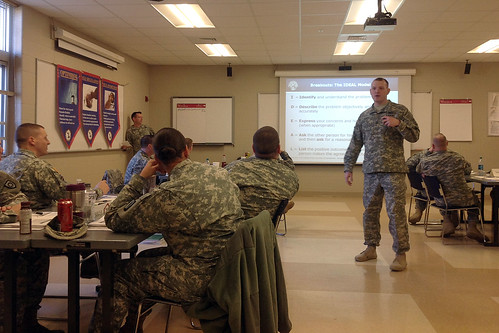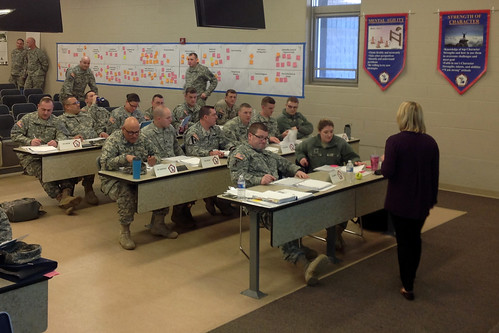Story by Capt. Ryan Hubbs, Kentucky National Guard Resilience Coordinator
[caption id="" align="aligncenter" width="576"]

Multiple deployments can take their toll on our citizen soldiers and their families, which in turn degrades readiness. Resilience training offers tools and resources to combat the negative affects incurred during mobilization. (Photo by Sgt. Alexa Becerra, 2/138th PA)
GREENVILLE, Ky. -- What makes a person be able to bounce back from adversity? Why do some people seem to thrive under pressure, while others can barely cope with the stresses of everyday life? Is it something you were born with, or is it a skill that can be learned?
For answers to these questions, the U.S. Army teamed up with the University of Pennsylvania and prominent psychologists to see what it was that makes an individual "resilient."
Resilience is defined as the ability of an object to spring back into shape, or more specifically (when dealing with Soldiers) the ability of a person to recover quickly from adversity. Although originally, psychologist believed that resiliency was a trait individuals were born with, they have now discovered that resiliency is a skill that can be learned by anyone.
[caption id="" align="alignleft" width="378"]

Kentucky Guardsmen participate in a group discussion as part of their Master Resiliency Trainer Course at the Wendell H. Ford Regional Training Center in Greenville, Ky., Jan. 20, 2015. (U.S. Army National Guard photo by Capt. Mike Moynahan)
It is no secret that today our men and women who serve in the National Guard face many situations which bring about stress. Juggling deployments, annual training, and drill weekends with a civilian job and family relationships can be extremely difficult, even for the most resilient individuals. It is because of this recognized stress that the Kentucky Army National Guard has seen fit to get as many Master Resilience Trainers as possible to teach these skills in their units, in order to make our Guard stronger.
From Jan. 12-23, leaders from a variety of units of the Kentucky Army Guard attended the Master Resilience Trainer Course at the Wendell H. Ford Regional Training Center in Greenville. Lead by Abbey Bradshaw, a resilience specialist from Fort Knox, the Resilience Team from the Michigan National Guard's Great Lakes Resilience Center and some help from the Army Reserves, Soldiers from across Kentucky were immersed in the optimistic world of resiliency.
[caption id="" align="alignright" width="413"]

The graduating class of the Kentucky National Guard's Master Resiliency Trainer Course at the Wendell H. Ford Regional Training Center in Greenville, Ky., Jan. 23, 2015. (U.S. Army National Guard photo by Capt. Mike Moynahan)
The two-week course teaches Soldiers a variety of skills dealing with how to become more self-aware of counterproductive thoughts and emotions and how to regulate them. The course focuses on optimistic thinking and gives Soldiers the tools be cool and confident in any situation. The course even teaches skills such as active constructive responding that help to foster better relationships with friends, family, and coworkers alike.
The course is with not without its critics though. The Army has been trying to eliminate the perception that it is "not okay" to share feelings.
"I was concerned about having to sit in a drum circle and talk about feelings," said Master Sgt. Chuck Shuff with the 20th Special Forces Group when he first learned he was going to attend the course. "I was relieved when that turned out not to be the case at all. These are practical skills that Soldiers need to have."
It is not uncommon for those who enter the course to be a little leery at first. However, by the end, almost all who complete the course say they come away with invaluable skills that not only help them become better Soldiers, but also better people.
[caption id="" align="alignleft" width="381"]

Kentucky Guardsmen attend a Master Resiliency Trainer Course at the Wendell H. Ford Regional Training Center in Greenville, Ky., Jan. 15, 2015. (U.S. Army National Guard photo by Capt. Mike Moynahan)
In an effort to spread the resiliency program, it is important to get buy-in from leaders at the top and whom Soldiers respect.
Capt. Mike Moynahan, a Ranger qualified Infantry company commander said, "The skills taught during the course are proven and effective, but it takes practice to become good at them. Mandatory training requirements can be overwhelming at times, but these skills will pay dividends while deployed for soldiers and their families."
Overall, the 32 Soldiers who participated in the training had overwhelmingly positive things to say about the course. In addition, the Kentucky Army Guard is now at 96% strength for units that require an MRT. Facts that keep leadership optimistic for the future of resiliency in the military.
"The positive response for the program here in Kentucky has been encouraging," said Maj. John Harvey who oversees the program. "With more than 125 MRTs trained and more classes scheduled, the Kentucky Guard is quickly becoming one of the most resilient states in the Nation."
For more details on how you can receive resilience training or become involved in the state resilience program, please contact your unit MRT or State Resilience Coordinator.